SHAFR Award-Winners Announced at the 2023 American Historical Association annual meeting
SHAFR Award-Winners Announced at the 2023 American Historical Association annual meeting
The Stuart L. Bernath Memorial Lecture Prize was established through the generosity of Dr. Gerald J. and Myrna F. Bernath, in memory of their late son, to recognize and encourage excellence in teaching and research in the field of foreign relations by scholars at the beginning of their historical careers.
 This year’s Bernath Lecture committee--Naoko Shibusawa (chair), Adriane Lentz-Smith, and Paul Thomas Chamberlin--have selected Professor Megan Black of the Massachusetts Institute of Technology to receive the 2023 Stuart L. Bernath Memorial Lecture Prize. Professor Black (Ph.D. George Washington University, 2015) has written a field-defining work of scholarship that not only bridges several fields but also resonates with scholars and students alike. The Global Interior: Mineral Frontiers and American Power (Harvard University Press, 2018) won four major book awards including the Stuart L. Bernath Book Prize for best first book as well as best book prizes from the American Society for Environmental Historians, the Western History Association, and the British Association for American Studies. By focusing on the Department of Interior’s activities in the post-World War II period, Black demonstrates how U.S. settler colonialism has informed and shaped its free trade imperialism. In doing so, she has helped redefine how we should study U.S. empire. Attentive to the material as well as to the ideological, The Global Interior is a remarkable work of scholarship that will remain on PhD field reading lists for many years to come.
This year’s Bernath Lecture committee--Naoko Shibusawa (chair), Adriane Lentz-Smith, and Paul Thomas Chamberlin--have selected Professor Megan Black of the Massachusetts Institute of Technology to receive the 2023 Stuart L. Bernath Memorial Lecture Prize. Professor Black (Ph.D. George Washington University, 2015) has written a field-defining work of scholarship that not only bridges several fields but also resonates with scholars and students alike. The Global Interior: Mineral Frontiers and American Power (Harvard University Press, 2018) won four major book awards including the Stuart L. Bernath Book Prize for best first book as well as best book prizes from the American Society for Environmental Historians, the Western History Association, and the British Association for American Studies. By focusing on the Department of Interior’s activities in the post-World War II period, Black demonstrates how U.S. settler colonialism has informed and shaped its free trade imperialism. In doing so, she has helped redefine how we should study U.S. empire. Attentive to the material as well as to the ideological, The Global Interior is a remarkable work of scholarship that will remain on PhD field reading lists for many years to come.
The William Appleman Williams Emerging Scholar Research Grants were established by SHAFR’s Council to promote scholarly research by members within six years of the PhD and working on their first research monograph. This year’s committee was chaired by Karen Miller (pictured below with grant recipients) and included Jay Sarkar and Dustin Walcher and is delighted to make three awards this year:
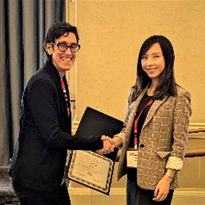 Vivien Chang received her PhD from the University of Virginia in 2022. She is currently the Henry Chauncey Jr. ’57 Postdoctoral Fellow of International Security Studies at Yale University. In her project, “Creating the Third World: Anticolonial Diplomacy and the Search for a New International Economic Order, 1960-1975,” Chang traces a shift in the economic commitments shared by anti-colonial and then postcolonial African elites in the era of decolonization. This group fostered transnational alliances with American Black Power activists. Initially, they embraced economic emancipation for African-descended people, a program based on liberation from colonial inequalities, regional cooperation, and cross-Atlantic activist solidarities. At the same time, American diplomats and private companies pushed aggressively against these economic visions. These sensibilities threatened U.S. elites’ interest in integrating African countries into an American-led global order. By the end of this era, however, Chang demonstrates that African and Black American actors had largely reconciled themselves to global capitalism and their countries’ roles within it. Ultimately, she concludes, “the most lasting result of debates” about development was “the creation of a ‘Third World’ embodied by Africa whose societies committed to adapting, for better or worse, to the logic of neoliberal globalization.”
Vivien Chang received her PhD from the University of Virginia in 2022. She is currently the Henry Chauncey Jr. ’57 Postdoctoral Fellow of International Security Studies at Yale University. In her project, “Creating the Third World: Anticolonial Diplomacy and the Search for a New International Economic Order, 1960-1975,” Chang traces a shift in the economic commitments shared by anti-colonial and then postcolonial African elites in the era of decolonization. This group fostered transnational alliances with American Black Power activists. Initially, they embraced economic emancipation for African-descended people, a program based on liberation from colonial inequalities, regional cooperation, and cross-Atlantic activist solidarities. At the same time, American diplomats and private companies pushed aggressively against these economic visions. These sensibilities threatened U.S. elites’ interest in integrating African countries into an American-led global order. By the end of this era, however, Chang demonstrates that African and Black American actors had largely reconciled themselves to global capitalism and their countries’ roles within it. Ultimately, she concludes, “the most lasting result of debates” about development was “the creation of a ‘Third World’ embodied by Africa whose societies committed to adapting, for better or worse, to the logic of neoliberal globalization.”
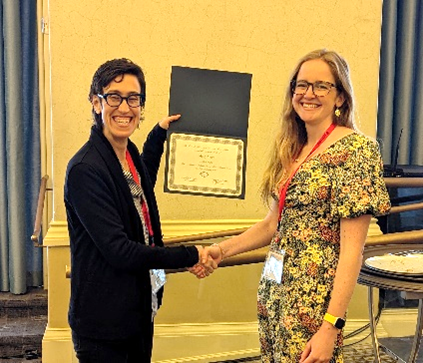 Molly Avery received her PhD in International History at the London School of Economics in 2022. She is now a Lecturer in the School of History at Queen Mary, University of London. Avery’s project, “The Latin American Anticommunist International: Chile, Argentina, and Central America, 1977-1984,” considers the relationships between Southern Cone and Central American anticommunists from the late 1970s into the 1980s. At the time, military oligarchies led by strongman, right-wing dictators ruled Chile and Argentina. These states intervened in the civil wars that were tearing apart Guatemala and El Salvador. They lent military, material, and political support to murderous anti-communist and anti-indigenous counterinsurgent leaders. Chilean and Argentine interest in these conflicts stemmed from their leaders’ commitment to undermining all Latin American communism, since they saw successful left-wing struggles anywhere in the region as threats to their own legitimacy. Turning away from more conventional diplomatic histories that examine Southern Cone dictatorships and Central American civil wars vis-à-vis their connections to the United States, Avery’s work illustrates the critical importance of bringing these conflicts together under a single lens that takes the violent and even genocidal institutionalization of autocratic anti-communist internationalism within Latin America seriously.
Molly Avery received her PhD in International History at the London School of Economics in 2022. She is now a Lecturer in the School of History at Queen Mary, University of London. Avery’s project, “The Latin American Anticommunist International: Chile, Argentina, and Central America, 1977-1984,” considers the relationships between Southern Cone and Central American anticommunists from the late 1970s into the 1980s. At the time, military oligarchies led by strongman, right-wing dictators ruled Chile and Argentina. These states intervened in the civil wars that were tearing apart Guatemala and El Salvador. They lent military, material, and political support to murderous anti-communist and anti-indigenous counterinsurgent leaders. Chilean and Argentine interest in these conflicts stemmed from their leaders’ commitment to undermining all Latin American communism, since they saw successful left-wing struggles anywhere in the region as threats to their own legitimacy. Turning away from more conventional diplomatic histories that examine Southern Cone dictatorships and Central American civil wars vis-à-vis their connections to the United States, Avery’s work illustrates the critical importance of bringing these conflicts together under a single lens that takes the violent and even genocidal institutionalization of autocratic anti-communist internationalism within Latin America seriously.
 Laila Ballout received her PhD from Northwestern University in 2017 and is currently an Assistant Professor of History at Wichita State University. Her project, “Saving Lebanon: Religion, Ethnicity, and Human Rights in the Reagan Era,” considers a range of U.S. Americans’ responses to the Lebanese Civil War from the end of the 1970s up through 1990 when the conflict ended. Indeed, “war in Lebanon attracted the interest of a diverse community of Americans because the stakes of the conflict intersected with major developments in U.S. politics.” In her study, Ballout uses the U.S. relationship with Lebanon as a site for understanding important shifts in U.S. foreign policy at the end of the Cold War. She traces two distinctive changes—the expanding role of religion, especially Christianity and Islam, in U.S. decision-making about international relations and the emergence and expansion of Islamophobic hostility toward Muslims and Arabs within the United States. She is particularly interested in the growing power of evangelical Christian Zionism outside of the borders of Israel and the changing contours of Arab-American identity, political engagement, and movements to defend Arab- and Muslim-American rights.
Laila Ballout received her PhD from Northwestern University in 2017 and is currently an Assistant Professor of History at Wichita State University. Her project, “Saving Lebanon: Religion, Ethnicity, and Human Rights in the Reagan Era,” considers a range of U.S. Americans’ responses to the Lebanese Civil War from the end of the 1970s up through 1990 when the conflict ended. Indeed, “war in Lebanon attracted the interest of a diverse community of Americans because the stakes of the conflict intersected with major developments in U.S. politics.” In her study, Ballout uses the U.S. relationship with Lebanon as a site for understanding important shifts in U.S. foreign policy at the end of the Cold War. She traces two distinctive changes—the expanding role of religion, especially Christianity and Islam, in U.S. decision-making about international relations and the emergence and expansion of Islamophobic hostility toward Muslims and Arabs within the United States. She is particularly interested in the growing power of evangelical Christian Zionism outside of the borders of Israel and the changing contours of Arab-American identity, political engagement, and movements to defend Arab- and Muslim-American rights.

The Myrna Bernath Committee—chaired by Lucy Salyer and including Kimber Quinney and Carol Chin—is delighted to announce that Sarah Meiners, PhD candidate in the History Department of Cornell University, is the recipient of the 2023 Myrna F. Bernath Fellowship. Meiners’ ambitious and provocative dissertation project, “Asylum Archipelago: Migration in the Borders of Empire in the Pacific and Caribbean,” examines the enforcement of U.S. migration and refugee policy at the peripheries of the U.S. empire. Reframing the United States as an “empire of migrants,” rather than a “nation of immigrants,” Meiners analyzes the role of U.S. territories and overseas military bases in responding to migration crises to illustrate how foreign and refugee policies became intertwined. The Committee was extremely impressed by the rigor and sophistication of the project and extends its warm congratulations to Sarah.
The Michael J. Hogan Foreign Language Fellowship honors the long-time editor of Diplomatic History and is intended to promote research in foreign language sources by graduate students. Katherine Marino chaired this year’s selection committee, which also included Lorenz Lüthi, and Victor McFarland.
 The committee awarded the 2023 Hogan Foreign Language Fellowship to Alina Bykova, a doctoral candidate at Stanford University. Her project, “Extraction Islands: Environment, Politics, and Security on Svalbard, 1850 to the Present,” engages both diplomatic and environmental history. The award will allow her to conduct research in the Norwegian Polar Institute archive. The committee was very impressed with the scope and ambition of the project.
The committee awarded the 2023 Hogan Foreign Language Fellowship to Alina Bykova, a doctoral candidate at Stanford University. Her project, “Extraction Islands: Environment, Politics, and Security on Svalbard, 1850 to the Present,” engages both diplomatic and environmental history. The award will allow her to conduct research in the Norwegian Polar Institute archive. The committee was very impressed with the scope and ambition of the project.
SHAFR’s Graduate Student Fellowship and Grant Committee makes the majority of our grants and fellowships each year. This year’s committee was chaired by Kate Burlingham and included Hiroshi Kitamura, Catherine Forslund, Christopher Dietrich (pictured below making the awards), and Elisabeth Leake. It is happy to announce the winners of a number of dissertation grants and fellowships to deserving graduate students:
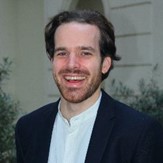 The Stuart L. Bernath Dissertation Grant was established by the family of the late Stuart L. Bernath to support dissertation research by graduate students in SHAFR. This year’s recipient is Evan Bonney, a PhD candidate in the History Department at Sciences Po, Paris. His dissertation, "Forests and Power in the United States Empire, 1891 to 1914," holds that U.S. relations with the German Empire played a powerful role in the management and surveillance of extensive areas of western North America and Puerto Rico. It promises to be an exemplary trans-imperial history. Building on the correspondence of German ambassadors, German and American foresters, and the director of the U.S. Department of Agriculture, Bonney will use the fellowship for research at the U.S. National Archives in the record groups of the State Department, Interior Department, Forest Service, General Land Office, and Bureau of Indian Affairs.
The Stuart L. Bernath Dissertation Grant was established by the family of the late Stuart L. Bernath to support dissertation research by graduate students in SHAFR. This year’s recipient is Evan Bonney, a PhD candidate in the History Department at Sciences Po, Paris. His dissertation, "Forests and Power in the United States Empire, 1891 to 1914," holds that U.S. relations with the German Empire played a powerful role in the management and surveillance of extensive areas of western North America and Puerto Rico. It promises to be an exemplary trans-imperial history. Building on the correspondence of German ambassadors, German and American foresters, and the director of the U.S. Department of Agriculture, Bonney will use the fellowship for research at the U.S. National Archives in the record groups of the State Department, Interior Department, Forest Service, General Land Office, and Bureau of Indian Affairs.
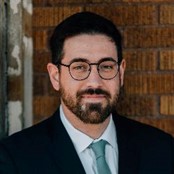 SHAFR established the Gelfand-Rappaport-LaFeber Fellowship to honor Lawrence Gelfand, founding member and former SHAFR president; Armin Rappaport, founding editor of Diplomatic History; and Walter LaFeber, founding member and former SHAFR president. This year’s winner is Brian McNamara, a PhD candidate in the History Department at Temple University. His dissertation, "American Africans: Conservative Black Internationalism in the Late Cold War," examines how conservative African Americans, who identified first and foremost as Americans, developed a distinct ideology through their ties in Africa. The fellowship will support research in the papers of Hosea Williams and Leon Sullivan at the Carter Presidential Library and in the Maurice Dawkins papers at the African American Research Library and Cultural Center in Fort Lauderdale.
SHAFR established the Gelfand-Rappaport-LaFeber Fellowship to honor Lawrence Gelfand, founding member and former SHAFR president; Armin Rappaport, founding editor of Diplomatic History; and Walter LaFeber, founding member and former SHAFR president. This year’s winner is Brian McNamara, a PhD candidate in the History Department at Temple University. His dissertation, "American Africans: Conservative Black Internationalism in the Late Cold War," examines how conservative African Americans, who identified first and foremost as Americans, developed a distinct ideology through their ties in Africa. The fellowship will support research in the papers of Hosea Williams and Leon Sullivan at the Carter Presidential Library and in the Maurice Dawkins papers at the African American Research Library and Cultural Center in Fort Lauderdale.
 The W. Stull Holt Dissertation Fellowship was created by SHAFR to defray the costs of travel necessary to conduct research on a significant dissertation project. This year’s winner is Andrew Klein, a PhD candidate at UCLA. His project, “Militant Capital: Race, Empire, and the Global History of Oakland, California, 1865-1980,” explores how global struggles over land, labor, and conquest transformed the social and ecological landscape of the Oakland-East Bay landscape. In particular, he traces Oakland’s tradition of racial internationalism to multi-generational struggles over the governance of coastal land that were part of a transit hub for long-distance trade, military logistics, and racialized migration. He will use SHAFR funds to visit archives in Washington, DC, and Hawai’i.
The W. Stull Holt Dissertation Fellowship was created by SHAFR to defray the costs of travel necessary to conduct research on a significant dissertation project. This year’s winner is Andrew Klein, a PhD candidate at UCLA. His project, “Militant Capital: Race, Empire, and the Global History of Oakland, California, 1865-1980,” explores how global struggles over land, labor, and conquest transformed the social and ecological landscape of the Oakland-East Bay landscape. In particular, he traces Oakland’s tradition of racial internationalism to multi-generational struggles over the governance of coastal land that were part of a transit hub for long-distance trade, military logistics, and racialized migration. He will use SHAFR funds to visit archives in Washington, DC, and Hawai’i.
SHAFR created the Samuel Flagg Bemis Dissertation Research Grants to help underwrite some of the research expenses related to doctoral dissertations. The committee awarded ten grants this year:
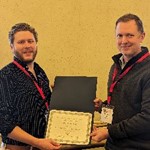 Graydon Dennison is completing his PhD in History at Temple University. His dissertation contributes to histories of U.S. imperialism through an examination of the different modes of control and influence exerted by U.S. state and non-state activists in the isthmus of Panama. Moving away from a focus on the building of the Panama Canal, he instead explores the U.S. presence in interwar Panama as a manifestation of settler colonialism.
Graydon Dennison is completing his PhD in History at Temple University. His dissertation contributes to histories of U.S. imperialism through an examination of the different modes of control and influence exerted by U.S. state and non-state activists in the isthmus of Panama. Moving away from a focus on the building of the Panama Canal, he instead explores the U.S. presence in interwar Panama as a manifestation of settler colonialism.
 Kaitlin Findlay is a PhD candidate at Cornell University. Her project looks at the International Committee of the Red Cross’s (ICRC) humanitarian oversight of population transfer and detention of persons of Japanese descent in the United States and Canada during the 1940s. By considering the ICRC in North America, rather than Europe, her project recontextualizes the histories of North American internment within the transnational politics and practices of early twentieth-century liberal internationalism. She will use SHAFR funds to conduct research at that ICRC archives in Geneva, Switzerland.
Kaitlin Findlay is a PhD candidate at Cornell University. Her project looks at the International Committee of the Red Cross’s (ICRC) humanitarian oversight of population transfer and detention of persons of Japanese descent in the United States and Canada during the 1940s. By considering the ICRC in North America, rather than Europe, her project recontextualizes the histories of North American internment within the transnational politics and practices of early twentieth-century liberal internationalism. She will use SHAFR funds to conduct research at that ICRC archives in Geneva, Switzerland.
 Syrus Jin is a doctoral student working with Mark Philip Bradley at the University of Chicago. His dissertation project, “Militarized Modernity, Military Advisors, and the Global US Security Architecture,” situates the rise of the U.S. security architecture in Asia in what he calls processes of “military modernization” that aimed to remake local societies in East and Southeast Asia, primarily Korea plus Taiwan, Japan, and the Philippines. Syrus investigates U.S. assistance and advisory missions abroad that deployed U.S. personnel, expertise, and materiel to Asia. In addition, the United States guided foreign military officers into U.S. educational institutes and military schools as exchange students where they actively exported ideas of military capacity and effectiveness abroad in an effort to develop those nations. The everyday experience of U.S. advisors, their Asian counterparts, and military students who studied in the United States provides a critical analytical lens that subverts the policy-level synopsis of what military-building entailed.
Syrus Jin is a doctoral student working with Mark Philip Bradley at the University of Chicago. His dissertation project, “Militarized Modernity, Military Advisors, and the Global US Security Architecture,” situates the rise of the U.S. security architecture in Asia in what he calls processes of “military modernization” that aimed to remake local societies in East and Southeast Asia, primarily Korea plus Taiwan, Japan, and the Philippines. Syrus investigates U.S. assistance and advisory missions abroad that deployed U.S. personnel, expertise, and materiel to Asia. In addition, the United States guided foreign military officers into U.S. educational institutes and military schools as exchange students where they actively exported ideas of military capacity and effectiveness abroad in an effort to develop those nations. The everyday experience of U.S. advisors, their Asian counterparts, and military students who studied in the United States provides a critical analytical lens that subverts the policy-level synopsis of what military-building entailed.
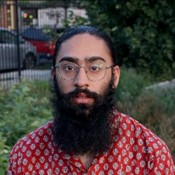 Damanpreet Pelia is a PhD candidate at Yale University in the Department of American Studies. Damanpreet’s project examines the American Presbyterian missionary presence in Punjab, from 1834 until the turn of the twentieth century. Uniquely, the study utilizes several archives in the UK to understand these relations. The study raises important questions about the relationship between religion, state power, and the global reach of the United States. Damanpreet will use SHAFR funds to conduct research at the British Library, the School of Oriental and African Studies, Cambridge University, and the University of Birmingham.
Damanpreet Pelia is a PhD candidate at Yale University in the Department of American Studies. Damanpreet’s project examines the American Presbyterian missionary presence in Punjab, from 1834 until the turn of the twentieth century. Uniquely, the study utilizes several archives in the UK to understand these relations. The study raises important questions about the relationship between religion, state power, and the global reach of the United States. Damanpreet will use SHAFR funds to conduct research at the British Library, the School of Oriental and African Studies, Cambridge University, and the University of Birmingham.
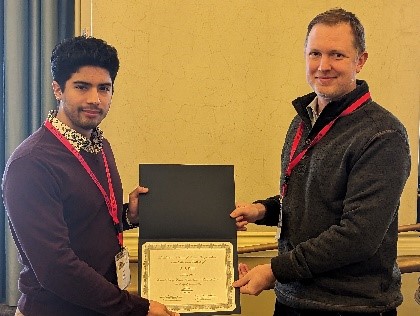 A. J. Perez is a PhD candidate at Penn State University. His dissertation explores the limits of U.S. Manifest Destiny by recounting the intertwined histories of Yucátan and Texas in the first half of the 19th century. His study, in particular, draws attention to the failed annexation of the Yucátan, illuminating the geopolitical power of the U.S. in the Gulf of Mexico. He will use the SHAFR funds to explore the Archivo General de la Nación in Mexico City.
A. J. Perez is a PhD candidate at Penn State University. His dissertation explores the limits of U.S. Manifest Destiny by recounting the intertwined histories of Yucátan and Texas in the first half of the 19th century. His study, in particular, draws attention to the failed annexation of the Yucátan, illuminating the geopolitical power of the U.S. in the Gulf of Mexico. He will use the SHAFR funds to explore the Archivo General de la Nación in Mexico City.
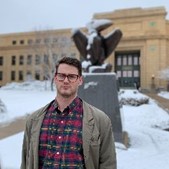 Sam Rogers is completing his PhD in History at the University of Kansas. His dissertation explores how and why human trafficking became key to U.S. policy in the aftermath of the Cold War. Drawing on state and international organization archives, as well as oral istories, he looks at a diverse set of activists to trace how human trafficking emerged as both a domestic and transnational policy issue in the 1990s.
Sam Rogers is completing his PhD in History at the University of Kansas. His dissertation explores how and why human trafficking became key to U.S. policy in the aftermath of the Cold War. Drawing on state and international organization archives, as well as oral istories, he looks at a diverse set of activists to trace how human trafficking emerged as both a domestic and transnational policy issue in the 1990s.
 Boyd Ruamcharoen is a PhD candidate, working with Christopher Capozzola in the Massachusetts Institute of Technology’s interdisciplinary doctoral program in History, Anthropology, and Science, Technology and Society. Boyd’s dissertation, “Tropical Preservation: Media Technologies and American Power in the Tropics,” uses the history of media technology preservation—namely for radio electronics and photographic film—in tropical climates since World War II to explore the United States’ projection of power into the wider post-war world. He tracks the circulation of media materials and of the technoscientific knowledge about their preservation (from heat, humidity, and fungus) in tropical climates in the United States and Global South. The U.S. military and a diverse set of historical actors employed such media in the tropical, decolonizing world and tapped into the science of environmental deterioration as they projected American economic and cultural power overseas. The grant will help with final research at the U.S. National Archives, the corporate archives of Kodak and the Radio Corporation of America (RCA), the Smithsonian Institute, UNESCO, and other international archives.
Boyd Ruamcharoen is a PhD candidate, working with Christopher Capozzola in the Massachusetts Institute of Technology’s interdisciplinary doctoral program in History, Anthropology, and Science, Technology and Society. Boyd’s dissertation, “Tropical Preservation: Media Technologies and American Power in the Tropics,” uses the history of media technology preservation—namely for radio electronics and photographic film—in tropical climates since World War II to explore the United States’ projection of power into the wider post-war world. He tracks the circulation of media materials and of the technoscientific knowledge about their preservation (from heat, humidity, and fungus) in tropical climates in the United States and Global South. The U.S. military and a diverse set of historical actors employed such media in the tropical, decolonizing world and tapped into the science of environmental deterioration as they projected American economic and cultural power overseas. The grant will help with final research at the U.S. National Archives, the corporate archives of Kodak and the Radio Corporation of America (RCA), the Smithsonian Institute, UNESCO, and other international archives.
 Richard Sakamoto-Pugh is a PhD student in History at Vanderbilt University. Working under the direction of Paul Kramer, his dissertation studies the formation and development of an inter-American police alliance involving the United States, Mexico, and Canada. Relying on multilingual archival materials from three countries, Sakamoto-Pugh investigates the rise of a transnational police regime between the 1930s and onset of the Cold War. This study will enrich our understanding of hemispheric relations during the middle decades of the 20th century and will specifically highlight the significance of surveillance and security in shaping the political and cultural dynamic from the Good Neighbor era and beyond.
Richard Sakamoto-Pugh is a PhD student in History at Vanderbilt University. Working under the direction of Paul Kramer, his dissertation studies the formation and development of an inter-American police alliance involving the United States, Mexico, and Canada. Relying on multilingual archival materials from three countries, Sakamoto-Pugh investigates the rise of a transnational police regime between the 1930s and onset of the Cold War. This study will enrich our understanding of hemispheric relations during the middle decades of the 20th century and will specifically highlight the significance of surveillance and security in shaping the political and cultural dynamic from the Good Neighbor era and beyond.
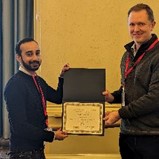 Rohan Shah is a doctoral candidate at Columbia University. Rohan’s dissertation looks at the unfolding of Nixon’s New Economic Policy from 1971 to 1987 to highlight the deep tensions between free-market ideas and U.S. nationalism, between labor and capital, and between producers and consumers that determined the “pre-history” of what came to be described as globalization in the 1990s. Rohan’s study follows economic bureaucrats and traces internal clashes over how to navigate the changing place of the United States in the world economy. He will use SHAFR funds to investigate the AFL-CIO Archives at the University of Maryland as well as the Henry M. Jackson Papers at the University of Washington.
Rohan Shah is a doctoral candidate at Columbia University. Rohan’s dissertation looks at the unfolding of Nixon’s New Economic Policy from 1971 to 1987 to highlight the deep tensions between free-market ideas and U.S. nationalism, between labor and capital, and between producers and consumers that determined the “pre-history” of what came to be described as globalization in the 1990s. Rohan’s study follows economic bureaucrats and traces internal clashes over how to navigate the changing place of the United States in the world economy. He will use SHAFR funds to investigate the AFL-CIO Archives at the University of Maryland as well as the Henry M. Jackson Papers at the University of Washington.
 Kaitlin A. Simpson is a Ph.D. student in History at the University of Tennessee, Knoxville. Working under the direction of Tore C. Olsson, Simpson examines the transnational formation of the cut flower industry in the Western Hemisphere. The dissertation specifically focuses on the interplay between the United States and Columbia, from which over 70 percent of cut flowers sold in the U.S. are produced. Through use of archival sources from the two countries, Simpson will demonstrate the political and economic forces that shaped the birth and growth of the cut flower enterprise since the mid 1960s and, in doing so, will reveal the roles of gender and consumerism in strengthening the hemispheric relationship.
Kaitlin A. Simpson is a Ph.D. student in History at the University of Tennessee, Knoxville. Working under the direction of Tore C. Olsson, Simpson examines the transnational formation of the cut flower industry in the Western Hemisphere. The dissertation specifically focuses on the interplay between the United States and Columbia, from which over 70 percent of cut flowers sold in the U.S. are produced. Through use of archival sources from the two countries, Simpson will demonstrate the political and economic forces that shaped the birth and growth of the cut flower enterprise since the mid 1960s and, in doing so, will reveal the roles of gender and consumerism in strengthening the hemispheric relationship.

